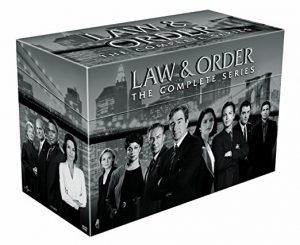The holiday season is upon us, and yet again, you have no idea what to get for the fickle lawyer or law student in your life. We’re here to help.
We’ve got an eclectic selection of fantastic legally themed holiday gifts for you to choose from, so settle in by that stack of documents yet to be reviewed and dig in.
We have so many offerings this year that we’ve categorized everything so you can either peruse the whole post or click on the link below to jump directly to the category that you think best suits your shopping mission:
Books
Apparel & Accessories
Games
Food & Drink
Desk Toys & Office Decor
Movies & Television
Luggage
(Disclosure: When available, we have used affiliate links.)
Books
Do you have a reader on your hands? Of course you do, you’re buying for an attorney! Grab a nice book to curl up with this holiday season — or to read on their next flight to some far-flung deposition.
 Former Acting SG and current Hogan Lovells litigator Neal Katyal (with Sam Koppelman) just released Impeach: The Case Against Donald Trump, a straightforward account of the mounting evidence against the president. You can check out an ATL interview with Katyal about the book here.
Former Acting SG and current Hogan Lovells litigator Neal Katyal (with Sam Koppelman) just released Impeach: The Case Against Donald Trump, a straightforward account of the mounting evidence against the president. You can check out an ATL interview with Katyal about the book here.
My Mom, The Lawyer is a children’s book from Michelle Browning Coughlin, founder of MothersEsquire, a nonprofit organization devoted to gender equity in the legal profession. All proceeds benefit MothersEsquire in its mission.
With the movie set to be released this month, this is a good time to check out Just Mercy, Bryan Stevenson’s 2015 account of the Walter McMillian case. I’m not sure “spoilers” applies to non-fiction, but if you’re buying for the type that wants to see the movie cold, just get the book and they can read it later. Speaking of movies, Dark Waters with Mark Ruffalo is already out, and you can read all about that legal battle against DuPont in Exposure.
You’d think a lawyer wouldn’t need a book like this, but then you hear the positions the SG’s office is willing to take these days and realize everyone could use a refresher, like How To Read The Constitution and Why by CBS Legal Analyst Kim Wehle. Eric Foner also has a historical look at The Second Founding charting the effort to remake the Republic.
Finally, two entries charting the epic failures of the system and the delinquent efforts to right the ship. Rachel Denhollander’s What Is A Girl Worth? discusses her role in breaking the silence surrounding USA Gymnastics and its years of covering for Larry Nassar. Ronan Farrow covers some of the same ground in Catch & Kill: Lies, Spies, and the Conspiracy To Protect Predators
apparel & accessories
 RBG has gotten the Goddess Coin treatment over at Awe Inspired. Dissent Pins also sells a line of pins and necklaces in honor of the justice and Etsy offers some cute Supreme Court pins as well.
RBG has gotten the Goddess Coin treatment over at Awe Inspired. Dissent Pins also sells a line of pins and necklaces in honor of the justice and Etsy offers some cute Supreme Court pins as well.
 ESK Esq. has a whole line of apparel for the lawyer out there including a stylized view of glorious Blackacre of Property Law fame and an International Shoe logo for Civ Pro nerds. If you’re buying for a law student this season, consider this Lawyer-Loading shirt or this shirt featuring the refrain of law students everywhere.
ESK Esq. has a whole line of apparel for the lawyer out there including a stylized view of glorious Blackacre of Property Law fame and an International Shoe logo for Civ Pro nerds. If you’re buying for a law student this season, consider this Lawyer-Loading shirt or this shirt featuring the refrain of law students everywhere.
Here’s a shirt for every good Sunny fan who knows the benefit of a solid education in Bird Law. Here’s a Nelson & Murdock shirt for the comic book set — I’m still searching for a Goodman, Lieber, Kurtzberg & Holliway shirt for the fan that wants to be really obscure.
There’s even a shirt for the office holiday party.
Here’s a Legal Pad Bow Tie. Is the lawyer in your life a nerd or a complete nerd? Because if it’s the latter, then you absolutely have to buy this legal pad bow tie, the perfect sartorial statement against the kids and their damn computer note-taking.
What better stocking stuffer than… stockings.
Games
 Looking for a diversion from billable hours?
Looking for a diversion from billable hours?
The LAWSUIT! board game makes a fantastic holiday gift for clients, lawyers, friends, and family. The game’s setting is the day-to-day operation of a law firm where players bring fictitious lawsuits with whimsical premises, and can elect to settle or appeal cases.
Makers of the official chess set of the Supreme Court Historical Society! Approach the Bench makes great gifts for attorneys, law students, or anyone in the legal profession. They offer courtroom-themed chess sets, Judge, Blind Justice, and Attorney bottle stoppers, ornaments, and lawyer, Judge, and Blind Justice chocolate bars!
FOOD & DRINK
 This wine bottle holder is so delightfully weird that it comes all the way back around into awesome. There’s some serious detail work on this thing.
This wine bottle holder is so delightfully weird that it comes all the way back around into awesome. There’s some serious detail work on this thing.
Or for the more honest out there, we have this World’s Okayest Lawyer Mug .
.
What better way to get into the holiday spirit than to enjoy some holiday spirits? Caskers, founded by Harvard Law grads, curates all varieties of the best craft spirits from around the world and offers discounts of up to 40% of retail prices.

‘The Foodie’ via Teak & Twine
Teak & Twine offers gift boxes for all people and occasions. While everything is customizable, here are a few suggestions for curated boxes that the folks there suggested:
- For the attorney who has everything, The Tuxedo: Sophisticated and classic, this gift features elevated edibles.
- For your top clients, The Foodie – The most mouth-watering of our gifts and our top corporate seller.
- For the hardworking law student, The Dream Job – A fine notebook and coffee: law school essentials!
Do we have puns? Sure! And another one. Even this stretch of one.
Chocolate Text lets you send chocolate messages to anyone you desire. Personally, I’d go for “You’ve Been Served.” You can also order a “Selfie Tin.” Simply upload a picture and Chocolate Text places it on a tin of your choice of sweet treats. The perfect place for that photo of your favorite lawyer shaking hands with a Supreme Court justice or walking up to get their degree.
 Is a lawyer having a good day or a bad day? This wine glass will let everyone know. Meanwhile this wine glass explains why the lawyer is drinking today.
Is a lawyer having a good day or a bad day? This wine glass will let everyone know. Meanwhile this wine glass explains why the lawyer is drinking today.
Finally, a Zazzle user has a take on the ubiquitous “Keep Calm” motif, with these “Keep Calm and Call A Lawyer” candy jars.
Desk Toys & Office Decor

Lawyers spend most of their lives behind their desks, so why not spice them up a little? Sure they might appreciate a framed picture of their loved ones, but these thoughtful trinkets might make for better conversation pieces.
This is a cute business card holder of a female lawyer sitting at her desk — making it very meta. This glass card holder can be personalized.
 And then there are Funko Pops. You know, those big head toys that seem to be everywhere these days. They even make Golden Girls Funko Pops now, which seems like the border of market saturation. But there are some legal Pops out there like this one of Matt Murdock or this lawyer She-Hulk one. There’s a Citadel-dwelling Lawyer Morty from Rick and Morty. And, obviously, there’s Saul Goodman and Jimmy McGill. For that matter, Abraham Lincoln was a lawyer.
And then there are Funko Pops. You know, those big head toys that seem to be everywhere these days. They even make Golden Girls Funko Pops now, which seems like the border of market saturation. But there are some legal Pops out there like this one of Matt Murdock or this lawyer She-Hulk one. There’s a Citadel-dwelling Lawyer Morty from Rick and Morty. And, obviously, there’s Saul Goodman and Jimmy McGill. For that matter, Abraham Lincoln was a lawyer.
It’s not exactly meant for the desk, but this is a nice decorative touch for the office. It’s a framed copy of the patent artwork for the gavel. Specifically, U.S. Patent 2,755,833 — also known as the Hollow-Headed Gavel With Telescopic Handle Section.
Someone at CafePress has a billable hours clock available to mix decor with some wit.
movies & Television
 Lawyers may not have a lot of free time, but when they have a chance to catch up with the world, they can thank you for providing them something fantastic for their viewing pleasure.
Lawyers may not have a lot of free time, but when they have a chance to catch up with the world, they can thank you for providing them something fantastic for their viewing pleasure.
Like the complete series of Law & Order. If you wanted to know what twenty season bundle of disks looks like, well there you go.
Speaking of series, the complete runs of Perry Mason, Matlock, and Ally McBeal are all available. Personally, I’d take the various seasons of Harvey Bridman or Better Call Saul though.
 There was a stellar RBG documentary last year that you can pick up. We reviewed the film here.
There was a stellar RBG documentary last year that you can pick up. We reviewed the film here.
Classical movie buffs might appreciate this 50th Anniversary Edition of 12 Angry Men or an opportunity to revisit Atticus Finch before he became a racist in Go Set A Watchman. On the ridiculous side, perhaps they’d enjoy Al Pacino’s turn as Satan in Devil’s Advocate. Then there’s the greatest courtroom film of all time, My Cousin Vinny.
Luggage


The essential gift for a traveling lawyer! The ScanFast Briefcase from Mobile Edge is a TSA-compliant laptop bag that allows the traveler to keep their laptop inside their bag while passing through TSA security checkpoints. This makes traveling with your laptop simple while keeping your laptop secure.

For a less standard design, check out this option (which also comes in three other color combinations). The bag is still TSA-compliant and boasts rich pink suede and brown faux-leather exterior highlighted by a bright color-accented satin lining. A matching shoulder strap, separate zippered workstation for files, and a trolley strap for rolling luggage included. Carries a Lifetime Warranty!
Seriously, peruse all of the MobileEdge offerings while shopping.
If you come across any more cool holiday gift ideas for attorneys, send them our way! We’re always looking to add more to the annual guide.
 Joe Patrice is a senior editor at Above the Law and co-host of Thinking Like A Lawyer. Feel free to email any tips, questions, or comments. Follow him on Twitter if you’re interested in law, politics, and a healthy dose of college sports news. Joe also serves as a Managing Director at RPN Executive Search.
Joe Patrice is a senior editor at Above the Law and co-host of Thinking Like A Lawyer. Feel free to email any tips, questions, or comments. Follow him on Twitter if you’re interested in law, politics, and a healthy dose of college sports news. Joe also serves as a Managing Director at RPN Executive Search.
 Joe Patrice is a senior editor at Above the Law and co-host of Thinking Like A Lawyer. Feel free to email any tips, questions, or comments. Follow him on Twitter if you’re interested in law, politics, and a healthy dose of college sports news. Joe also serves as a Managing Director at RPN Executive Search.
Joe Patrice is a senior editor at Above the Law and co-host of Thinking Like A Lawyer. Feel free to email any tips, questions, or comments. Follow him on Twitter if you’re interested in law, politics, and a healthy dose of college sports news. Joe also serves as a Managing Director at RPN Executive Search.


 Former Acting SG and current Hogan Lovells litigator Neal Katyal (with Sam Koppelman) just released
Former Acting SG and current Hogan Lovells litigator Neal Katyal (with Sam Koppelman) just released  RBG has gotten the
RBG has gotten the  Looking for a diversion from billable hours?
Looking for a diversion from billable hours? This
This 
 Is a lawyer having a good day or a bad day? This
Is a lawyer having a good day or a bad day? This 
 And then there are Funko Pops. You know, those big head toys that seem to be everywhere these days. They even make
And then there are Funko Pops. You know, those big head toys that seem to be everywhere these days. They even make  Lawyers may not have a lot of free time, but when they have a chance to catch up with the world, they can thank you for providing them something fantastic for their viewing pleasure.
Lawyers may not have a lot of free time, but when they have a chance to catch up with the world, they can thank you for providing them something fantastic for their viewing pleasure. There was a
There was a 






 Jordan Rothman is a partner of
Jordan Rothman is a partner of 






